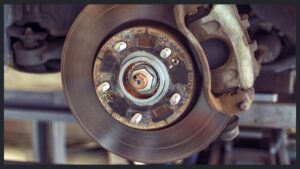
7 Causes of Grinding Noise When Braking
Hydraulic pressure is used to activate the brakes on your car. Each wheel on your car has its own brake attached to it.
These brakes usually consist of brake pads that create friction against the brake disc to slow down your vehicle. All of these braking functions are controlled by the hydraulic system. So when you press the brake pedal, the wheels slow down or stop spinning. There’s more pressure to slow the vehicle down after you press the brake pedal.
For this reason, all vehicles use disc brakes on the front wheels, even if the rear wheels are drum brakes. Most vehicles have disc brakes on all four corners.
What causes a squeaking noise when braking?
Normally, when you press the brake pedal, it should feel nice and smooth as your vehicle slows down. However, if you feel vibrations or hear strange noises when you press the pedal, there must be a problem with your braking system.
Here are the 7 most common causes of noises and vibrations when you press the brake pedal.
1) Dry Caliper Bolts
Caliper bolts have sliders that need constant lubrication. Otherwise, they will make a grinding noise when dry. This doesn’t happen often, but it can happen occasionally. Older cars are more likely to have dry caliper bolts. If so, have your local auto repair shop grease them or service your brakes if you need new pads or rotors. Lubricating brake caliper bolts is also an easy DIY job.
2) Brake Rotor Wear
An intact brake disc is flat and doesn’t make any strange noises when braking. However, brake rotors tend to wear down over the years, and corrosion or rust can cover parts of the rotor. Eventually it will become uneven instead of flat, causing a loud squealing noise every time you press the brake pedal. If too much cold water comes into contact with a hot rotor and it warps the rotor, you will notice a slight grinding noise every time the wheel turns.
3) Worn brake pads
Continued use of your brake pads wears away the material on the surface of each pad, eventually exceeding the minimum thickness. When this metal comes into contact with the surface of the brake disc, it creates a loud grinding noise as it bites into the disc. Not only is the noise loud and annoying, but it also damages the brake disc and requires replacement.
4) Bad Washers
Brake washers are specifically designed to prevent noise between the brake disc and the brake pads. These washers are simply a layer of rubber placed between the two components. The material may weaken slightly over time. As a result, your brakes are less able to prevent brake noise.
5) Rust and Corrosion
If you leave your car in the garage for weeks or months, you can expect these metal components to rust and corrode due to normal humidity.
When this happens, you will hear all sorts of strange noises from your brakes until you clean or replace these components depending on the level of rust and corrosion.
6) Brake debris
There may be foreign objects in your brake system that are causing these strange noises. If there is such a hard deposit between the caliper and the disc brake, it will definitely cause a strange noise here. Moreover, the deposit can damage the brake rotor if not removed immediately.
7) Faulty Wheel Bearings
Faulty wheel bearings can cause irregular noises in the braking system. Sometimes it can be loud, but sometimes it can be soft and quiet. Leave nothing to chance: replace defective wheel bearings immediately.

